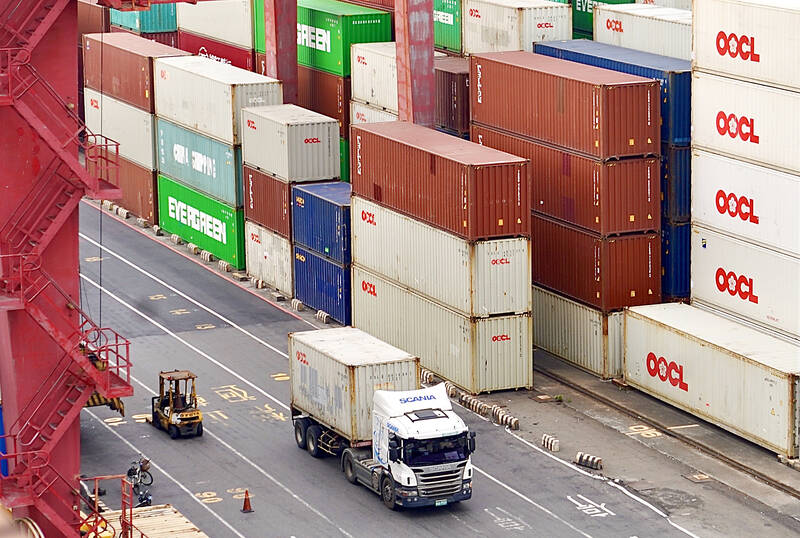Taiwan’s exports last month soared 29.9 percent year-on-year to US$48.66 billion, the second-highest on record, thanks to front-loading demand for tech products used in artificial intelligence (AI) and high-performance computing, after Washington announced a 90-day respite for its “reciprocal” tariffs, the Ministry of Finance said yesterday.
Last month’s export momentum proved stronger than expected and is to continue this month, with an annual increase of 15 percent to 20 percent, Department of Statistics Director-General Beatrice Tsai (蔡美娜) said.
“Front-loading demand and rush orders are evident across sectors,” Tsai said. “The 90-day pause prompted firms on the sidelines to actively build inventory.”

Photo: CNA
That could disrupt seasonality for technology products — with the first half of this year outperforming the second half in terms of sales, Tsai said.
Outbound shipments of information and communications technology products spiked 60.5 percent annually to US$18.83 billion last month, overtaking electronic components as the top driver, on the back of demand from AI infrastructure and big data centers, she said.
Shipments of electronic components, mainly chips, increased 26.8 percent to US$16.41 billion, consistent with Taiwan Semiconductor Manufacturing Co’s (台積電) expectations.
The company has said that it does not see customers canceling orders amid uncertainty related to US tariffs.
Front-loading also benefited exports of chemicals, base metals, optical products and machinery equipment, the ministry said, adding that last month, all major markets’ shipments — except Europe — recorded double-digit percentage growth.
Mexico saw a threefold increase, while Malaysia rapidly climbed to the fourth-largest export destination, after China, the US and Japan, Tsai said, adding that it was due to the ongoing global supply chain realignment.
Imports last month also expanded 33 percent year-on-year to US$41.16 billion, fueled by local tech firms’ purchases of capital equipment and the deepening of global division of labor in the tech supply chain, Tsai said.
That gave Taiwan a trade surplus of US$7.21 billion in the month, up 15 percent from a year earlier.
Tsai declined to comment on the effect of the New Taiwan dollar’s rapid appreciation on exports, saying that she cannot pass judgment on the issue based on customs data alone.
However, Tsai said she believed Taiwanese firms command the pricing power in areas where they maintain a strong global competitive edge.
With global cloud service providers’ AI infrastructure investments showing no signs of deceleration, Taiwan appears poised to maintain its export strength in the months ahead, she said.
In the first four months of this year, cumulative exports rose 20.6 percent to US$178.23 billion, while imports gained 20.4 percent to US$147.38 billion from a year earlier, ministry data showed.

On Tuesday, US President Donald Trump weighed in on a pressing national issue: The rebranding of a restaurant chain. Last week, Cracker Barrel, a Tennessee company whose nationwide locations lean heavily on a cozy, old-timey aesthetic — “rocking chairs on the porch, a warm fire in the hearth, peg games on the table” — announced it was updating its logo. Uncle Herschel, the man who once appeared next to the letters with a barrel, was gone. It sparked ire on the right, with Donald Trump Jr leading a charge against the rebranding: “WTF is wrong with Cracker Barrel?!” Later, Trump Sr weighed

HEADWINDS: Upfront investment is unavoidable in the merger, but cost savings would materialize over time, TS Financial Holding Co president Welch Lin said TS Financial Holding Co (台新新光金控) said it would take about two years before the benefits of its merger with Shin Kong Financial Holding Co (新光金控) become evident, as the group prioritizes the consolidation of its major subsidiaries. “The group’s priority is to complete the consolidation of different subsidiaries,” Welch Lin (林維俊), president of the nation’s fourth-largest financial conglomerate by assets, told reporters during its first earnings briefing since the merger took effect on July 24. The asset management units are scheduled to merge in November, followed by life insurance in January next year and securities operations in April, Lin said. Banking integration,

LOOPHOLES: The move is to end a break that was aiding foreign producers without any similar benefit for US manufacturers, the US Department of Commerce said US President Donald Trump’s administration would make it harder for Samsung Electronics Co and SK Hynix Inc to ship critical equipment to their chipmaking operations in China, dealing a potential blow to the companies’ production in the world’s largest semiconductor market. The US Department of Commerce in a notice published on Friday said that it was revoking waivers for Samsung and SK Hynix to use US technologies in their Chinese operations. The companies had been operating in China under regulations that allow them to import chipmaking equipment without applying for a new license each time. The move would revise what is known

Artificial intelligence (AI) chip designer Cambricon Technologies Corp (寒武紀科技) plunged almost 9 percent after warning investors about a doubling in its share price over just a month, a record gain that helped fuel a US$1 trillion Chinese market rally. Cambricon triggered the selloff with a Thursday filing in which it dispelled talk about nonexistent products in the pipeline, reminded investors it labors under US sanctions, and stressed the difficulties of ascending the technology ladder. The Shanghai-listed company’s stock dived by the most since April in early yesterday trading, while the market stood largely unchanged. The litany of warnings underscores growing scrutiny of